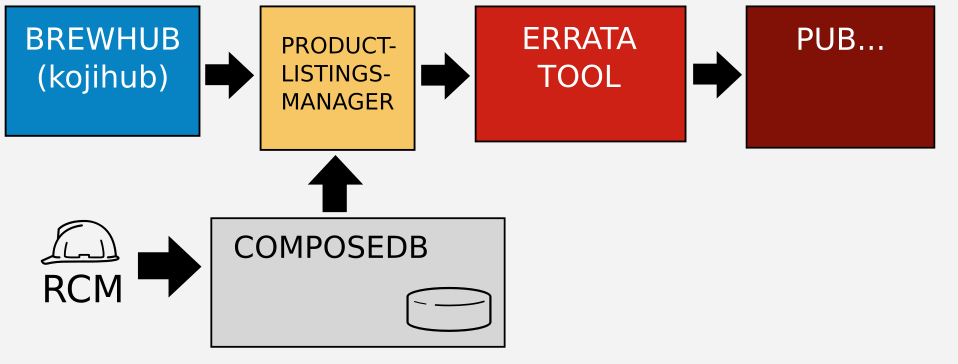HTTP interface for finding product listings and interacting with data in composedb.
Previously this mechanism was a Koji plugin. This product-listings-manager project extracts the plugin into its own web service apart from Koji.
You may use HTTP GET request to get /api/v1.0/product-info/<PRODUCT> or /api/v1.0/product-listings/<PRODUCT>/<BUILD_INFO>. The parameters and results are same as for the XML-RPC getProductInfo and getProductListings calls used in Brew. See client.py for an example.
All RPM-based products shipped through the Errata Tool use ComposeDB for "product listings".
ComposeDB defines a product by mapping RPMs to products/variants/arches.
- Implement the Brew plugin's API and functionality exactly, in order to minimize Errata Tool changes when migrating to this new service.
- Eliminate Brew/Koji's constraint of using XML-RPC
- Decouple the development of this service so that it is easier to develop, test, and deploy apart from Brew's prod environment.
Install the prerequisite system packages:
$ sudo dnf -y install postgresql-devel krb5-devel rpm-devel gcc python-devel python3-virtualenvwrapperSet up a virtualenv:
$ mkvirtualenv -p python3 plm
... Run
source /usr/bin/virtualenvwrapper.shifmkvirtualenvcommand not available
Install the prerequisite packages:
$ workon plm $ pip install -r requirements.txtCreate
config.pywith the database settings:$ echo "SQLALCHEMY_DATABASE_URI = 'postgresql://myusername:mypass@dbhost/dbname'" > config.py $ vi config.pySet the
PLM_CONFIG_FILEenvironment variable to the full filesystem path of this new file:$ export PLM_CONFIG_FILE=$(pwd)/config.pyInstall brewkoji package. This creates
/etc/koji.conf.d/brewkoji.conf, soproducts.pycan contact the Brew hub:$ sudo dnf -y install brewkojiTrust Brew's SSL certificate:
$ export REQUESTS_CA_BUNDLE=/etc/pki/ca-trust/source/anchors/RH-IT-Root-CA.crt
... Or if you've installed this globally on your system, tell requests to use your global CA store:
$ export REQUESTS_CA_BUNDLE=/etc/pki/tls/certs/ca-bundle.crt
Run the server:
$ FLASK_APP=product_listings_manager.app flask run
The Flask web server will run on TCP 5000.
You can access the http://localhost:5000/ at that point.
Install required packages for test:
$ pip install -r test-requirements.txtYou can invoke the tests with tox:
$ toxAlternatively, you can run pytest directly:
$ pytest --cov=product_listings_manager testsUsing the --live argument if you want to run against the live composedb instance:
$ pytest --cov=product_listings_manager --live testsSee database.rst for instructions to configure a local postgres instance.

